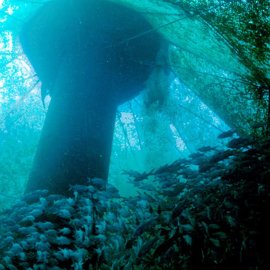Aquaculture Revisited
-
English
-
ListenPause
[intro music] Welcome to World Ocean Radio… I’m Peter Neill, Director of the World Ocean Observatory. It’s been a while since we have discussed aquaculture on World Ocean Radio. We surely remember the controversy first associated with the industry: in-water conflict with local fishermen, pollution by fish waste and feed, the use of antibiotics to control pests and disease, escape into and compromise of wild fish. In many areas, where I live and in other north Atlantic water, enthusiasm for aquaculture has waned for been re-directed to shellfish – mussels and oysters in particular. Nonetheless, in the markets, farm-grown fish is ever more prevalent as market share and as distinguished from fish wild caught, this latter communications phenomenon much a result of increased public awareness of the scarcity of fish in general as a result of over-fishing, the near eradication of some species from our diet, indeed from the ocean entirely. The key differential is, of course, price, and in some cases quality and taste. But the crisis in fisheries remains – the consumption rate grows, patterns of illegal and over-fishing continue, and the need for aquaculture as a strategy for supply expands to meet the increasing consumer demand. The aquaculture industry has a de facto roll as a function of necessary protein to sustain and nurture human health; the question posed was, “Could we cleanup its process and product as a responsible response to global nutritional requirement?” If you take salmon as an example, I think you can present a case for astonishing industry progress. Norway has been responsible for much of this, and at the recent Economist summit of ocean leaders, CEO of Cermaq, a major Norwegian salmon farm, outlined the steps taken to change the industry from a negative to a positive producer in the world market. First: vaccines have been introduced to substitute for antibiotics, each fish inoculated against disease just as humans; second: DNA genetics have been programmed to be resistant to specific biological threats; third: the composition of feed has been replaced by sustainable materials from vegetables and bio-industry by-products; and fourth: the structure of farms has been radically modified, strengthened, and secured, and the in-the-water pens re-designed. What is most astonishing is the capacity to track fish through remarkable new technology: every fish identified as an individual, and data collected accrued to the specificity of one animal within a group. Thus, the capacity exists to sort fish according to individual characteristics and needs: size, feed, treatments, pest control, and other measures of growth and health. It also enables immediate notice and control of the potential escape of any single fish, reducing introduction of farm-fish into the wild to a minimum. The consequence of these process modifications is the production of salmon that maximizes its value within the entirety of human need and concern. But the salmon industry has further surprise, again at the initiative of Norway. Last month, here in Maine in the United States where I live, two different Norwegian companies announced a total of $750 million to be invested in two coastal towns where newly constructed aquaculture plants employing several hundred workers will be built as closed system farms on-shore. This is another revolutionary change, relocating the farm process to land, adjacent to a salt water supply for intake, serving a closed circuit system for growth, treating the waste as part of the process, recycling the water, and returning only treated output back to the ocean, pollution free. In both cases, these enterprises have been located on public property, re-employing workers and replenishing the economic and cultural vitality of two towns in real need of revitalization. This progress is certainly not confined to Norway or the United States. On a recent trip to Chile where traditional salmon farming is a large part of the national economy, similar change is forthcoming, and not limited to salmon only. In Valparaiso I met an entrepreneur with a site and financing for a similar onshore, closed circuit farm to grow Chilean sea bass through its entire life cycle using similar technology. The fish world is changing. If we continue to over-harvest, over-consume, and pollute coastal waters and the deep ocean, aquaculture will be the only way forward to feed and sustain the public health of a growing world population. Protein and fresh water are the two essential requirements for individual and community survival. Through aquaculture and desalination, the ocean will provide both in full, if we will only let it be. We will discuss these issues, and more, in future editions of World Ocean Radio. [outro music]
Aquaculture has long been a controversial industry fraught with conflict: waste and feed pollution, use of antibiotics, escape of genetically modified species, and more. But as seafood demand continues to grow unabated and overfishing practices continue, the farm-grown fish industry will continue to function as a response to that demand. In this episode of World Ocean Radio, host Peter Neill outlines a number of steps and improved technologies that have been employed to change the aquaculture industry from a negative to a positive producer in the world economy.
About World Ocean Radio
Peter Neill, Director of the World Ocean Observatory and host of World Ocean Radio, provides coverage of a broad spectrum of ocean issues from science and education to advocacy and exemplary projects. World Ocean Radio, a project of the World Ocean Observatory, is a weekly series of five-minute audio essays available for syndicated use at no cost by college and community radio stations worldwide.
If you value World Ocean Radio, please consider becoming a Patreon Supporter today.
Image Credit
Offshore aquaculture operation. NMFS/NOAA
Learn More
< Norwegian Company to Build Large Land-Based Salmon Farm in Maine
< The Many Sides of Sustainability in Aquaculture
< Precision fish farming: New framework to improve production in aquaculture
- Login to post comments



